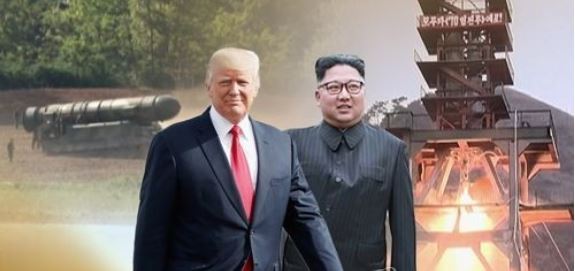WASHINGTON -- US President Donald Trump said Wednesday that "talking" will not solve the standoff with North Korea, signaling a more aggressive response to the regime's nuclear and missile programs.
Trump made the remark on Twitter, saying, "The US has been talking to North Korea, and paying them extortion money, for 25 years. Talking is not the answer!"
 |
US President Donald Trump and North Korean leader Kim Jong-un. (Yonhap) |
It appeared to be his latest response to North Korea's firing Tuesday of a missile over Japan.
He initially said in a White House statement that "all options are on the table" to deal with the North Korean threats.
The tweet came shortly before US Defense Secretary Jim Mattis met with South Korean Defense Minister Song Young-moo at the Pentagon.
Seated across from Song, Mattis was asked by a reporter whether diplomatic solutions are off the table.
"No," he said flatly.
Asked what additional diplomatic solutions could be taken, he responded, "We're never out of diplomatic solutions. We continue to work together. The minister and I share a responsibility to provide for the protection of our nations, our populations, and our interests, which is what we're here to discuss today."
The White House said in a new statement that Trump spoke by phone with Japanese Prime Minister Shinzo Abe earlier in the day, their second conversation since Tuesday's missile test.
"The two leaders confirmed their continuing, close cooperation on efforts to address North Korea's launch of an intermediate range ballistic missile that overflew Japanese territory earlier this week," it said.
On Tuesday, the UN Security Council convened an emergency meeting to discuss the launch. The council then issued a statement condemning the launch as an "outrageous" threat and urging Pyongyang to stop further nuclear tests or provocations.
The US military, meanwhile, successfully tested a missile interception system off the coast of Hawaii early Wednesday. The USS John Paul Jones, a guided-missile destroyer, used Standard
Missile-6 guided missiles to intercept a medium-range ballistic missile launched from the Pacific Missile Range Facility on Kauai, Hawaii, according to the US Missile Defense Agency.
North Korean leader Kim Jong-un threatened to conduct more missile flights over Japan.
During their talks, Song and Mattis agreed that a strong military option can enhance diplomatic efforts to denuclearize North Korea, according to the South's defense ministry.
Mattis, in particular, expressed the US commitment to providing a robust extended deterrence to the Asian ally and defending it from any North Korean attack with an effective and overwhelming response.
"The two ministers expressed their support for the current diplomatic efforts to denuclearize the Korean Peninsula, and at the same time stressed the fact that a strong, effective and credible military response option increases the credibility of the diplomatic efforts," the Ministry of National Defense said in a press release.
Song and Mattis also agreed to accelerate efforts to enable an early transfer of wartime operational control of South Korean troops from Washington to Seoul and follow up during consultations in Seoul in October.
They will accelerate talks to revise a bilateral missile guideline, the ministry said, in an apparent reference to Seoul's request for an increase in the maximum weight of ballistic missile payloads from 500 kilograms to 1 ton.
It was Song's first meeting with Mattis since he took office last month.
Later in the day, he met with White House National Security Adviser H.R. McMaster.
On Thursday, he is to leave for Hawaii, where he plans to visit the US Pacific Command and meet with its commander, Adm. Harry Harris. (Yonhap)








